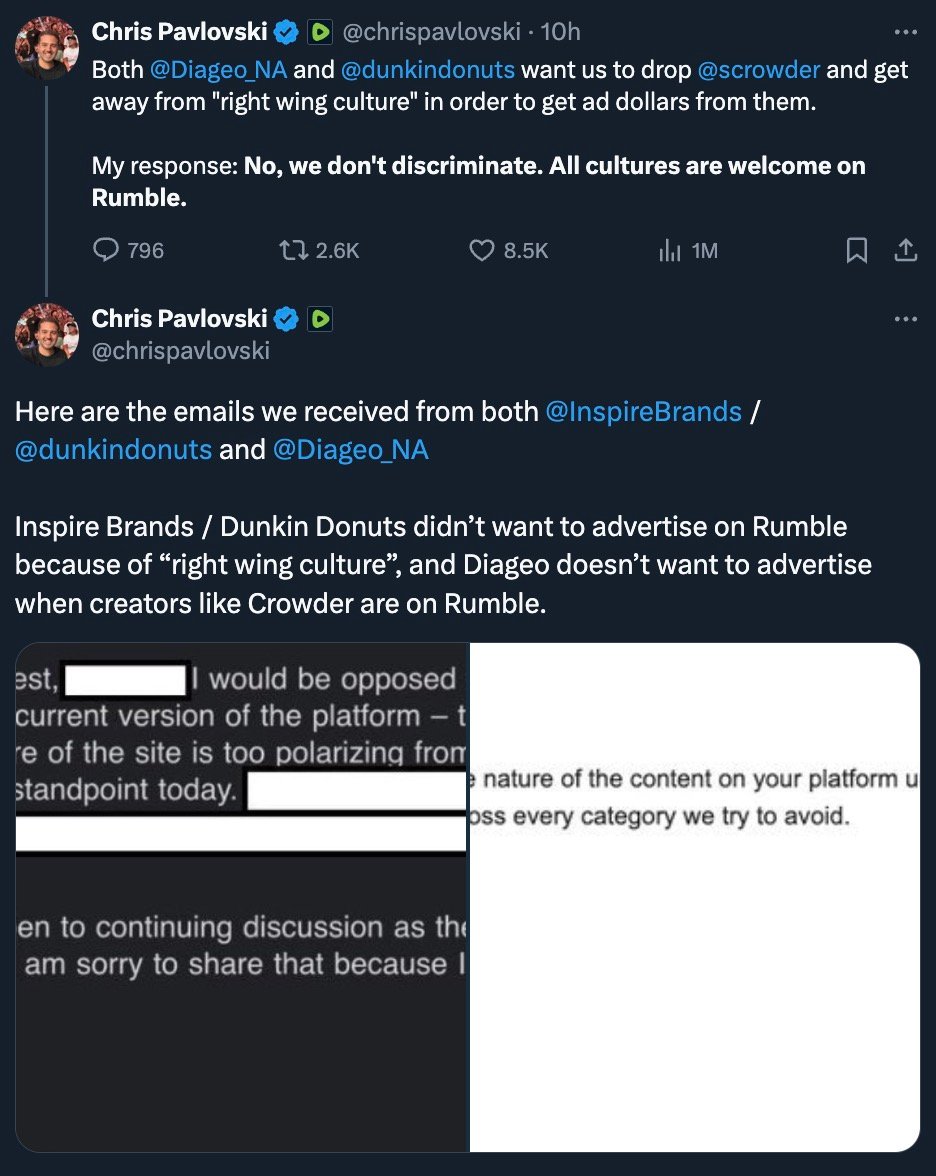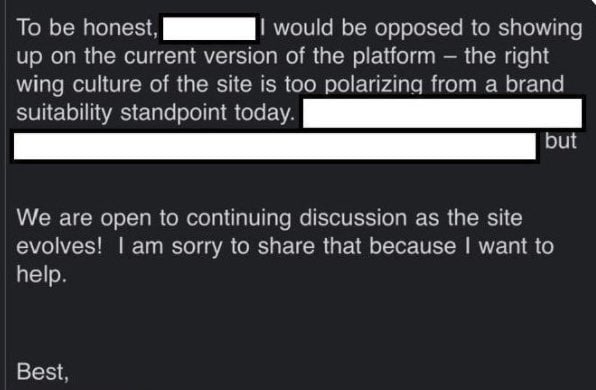On Tuesday, Linda Yaccarino, CEO of X Corp announced in a video post that the company had initiated a lawsuit against the Global Alliance for Responsible Media (GARM), its parent entity the World Federation Advertisers, and several key members including Mars, CVS Health, Unilever, and Orsted. The litigation, which also involves Rumble—a video-sharing site often praised by influencers as a bastion of free speech—accuses these entities of engaging in a boycott of certain platforms, thereby limiting consumer choice and stifling free expression.
Allegations of the advertising cartel acting as a monopoly are at the heart of the lawsuit and Rumble CEO Chris Pavlovski this week shared more insight into the issue of advertisers boycotting select video platforms.
Pavlovski posted an email from a representative of Diageo, explicitly saying that they won’t advertise on a platform that hosts Alex Jones and Stephen Crowder, two prominent political and cultural commentators.

Diageo is a global leader in the beverage alcohol sector. It was founded in 1997 and headquartered in London, UK. It operates in over 180 countries and is listed on both the London and New York stock exchanges. The company’s portfolio spans a range of well-known brands across spirits and beer. Notable spirits include Johnnie Walker, Smirnoff, Baileys, Captain Morgan, Tanqueray, and Don Julio. In the beer segment, Guinness stands out as a key brand, alongside other local beers depending on the market.
“One of my responsibilities is managing Diageo North America’s TMP process (Trusted Marketplace) and there is no scenario where we approve a platform that has Steven Crowder, Alex Jones, or the like,” the representative wrote in an email. “The content on your platform is non-compliant pretty much across every category we try to avoid.”


Pavlovski also revealed that Rumble approached Dunkin’ Donuts and its parent company Inspire Brands and was rejected for being a platform that allows “right wing culture.”
The advertisers are free to not advertise on certain creators on the platform, as they would with dominant platforms such as YouTube. However, unlike with YouTube, in Rumble’s case, the advertisers are choosing not to advertise on the platform at all.
The lawsuit filed by X and Rumble against major advertising entities and various high-profile brands illustrates a critical tension: platforms claim these advertisers are limiting consumer choice and stifling free expression by choosing not to support platforms that host certain types of content or commentators.
This form of indirect control over the content that gets to thrive on social media can be seen as a new frontier in the battle over free speech. Platforms like Rumble, which promote themselves as bastions of free speech, often find themselves at odds with major advertisers.
Advertising Cartels
Advertising cartels exacerbate these issues by coordinating actions among major brands to selectively sponsor content, which can effectively marginalize certain platforms and voices. This orchestrated approach raises concerns about the broader implications on consumer choice and the diversity of viewpoints accessible in digital spaces.
Restriction of Platform Viability: By collectively deciding which platforms to support or boycott, advertising cartels can make or break digital venues based on their content policies, not necessarily on their quality or the demand from viewers. This threatens smaller or niche platforms that might cater to specific audiences but are deemed risky or non-compliant with the stringent brand safety protocols that large advertisers uphold.
Influence Over Content: Cartels have the power to influence the editorial direction of platforms dependent on advertising revenue. When a platform relies heavily on ad dollars, the threat of losing major advertisers can lead to changes in content policies or the outright censorship of certain voices to align with the interests of these advertising groups. This can stifle free expression and reduce the richness of discourse available online.
Consumer Choice Limitation: The collective action of advertising cartels can limit consumer choice not just in terms of content variety but also in terms of platform diversity. Consumers may find themselves with fewer digital spaces that support diverse or controversial viewpoints, as platforms may be forced to sanitize content to attract necessary advertising revenue.
Creation of Monopolistic Conditions: Advertising cartels, by their nature, reduce competition in the advertising space, potentially leading to monopolistic practices. These conditions can result in higher costs for advertising, fewer choices for advertisers outside of the cartel, and a general reduction in the dynamism of the market. Such monopolistic tendencies can further centralize control over what is deemed acceptable content on major platforms, reinforcing the cycle of restricted speech and limited platform diversity.
Stifling Innovation: The fear of losing advertising revenue might deter new entrants and innovators from creating or maintaining platforms that challenge the status quo or seek to provide a voice to underrepresented or controversial figures. This stunts the evolution of digital platforms and can homogenize the online experience, reducing the overall quality and breadth of information available.






















